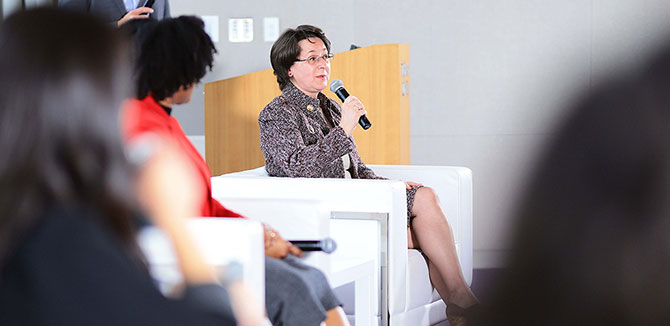Building, Leading, and Succeeding on Cross-Functional Teams
Abbott principal research scientist Felicia Bogdon shared how she's been able to develop multidisciplinary teams and what she looks for in potential hires.
Felicia Bogdan is a principal research scientist at Abbott Laboratories, where she leads a team of investigators responsible for developing biologic reagents used in blood screening assays for transfusion medicine.
Bogdan has spent 20 years in research and development at Abbott, where she's developed organic and bioconjugate reagents for more than 20 in-vitro diagnostic tests. The key to her productivity is her ability to develop and manage cross-functional, multidisciplinary teams within R&D and manufacturing. She recently talked about what it takes to lead — and succeed on — diverse teams as part of a panel discussion at Biotech Nexus, an event hosted by Northwestern Engineering's Master of Biotechnology Program (MBP).
To make effective reagents, she must blend the skills of her team members so they work well together while still allowing each to stand out in their own unique way.
“My goal is to teach everybody that we're a team," Bogdan said. "Our success depends on everybody. It requires a lot of discipline to bring a team together and get everyone to think along the same lines.”
Bogdan currently has 10 people who report to her as they work to develop biologic molecules for use in blood screening tests, a project she hopes to deliver to manufacturing for mass production in the next year or two. To keep her team functioning, Bogdan schedules multiple team meetings each week that are paired with one-on-one check-ins so that she can help each person develop their own career.
A key component in the process for her is shared decision-making.
“I try to facilitate the conversation and encourage them to come up with ideas and solutions,” Bogdan said. “Then I say, ‘OK, together, do we agree that this is how we’re going to move forward?’ That’s really important to build a team.”
It is also important to identify individuals who work well on a team. Bogdan has a few criteria she always looks for when interviewing potential team members:
- Do they have the necessary skill set?
- Are they scientifically curious?
- Are they creative?
- Do they think critically?
- Do they like to communicate?
- Do they want to be a team player?
Bogdan also tries to measure a person's passion for the work. Sometimes that comes across in how they present themselves, but in other instances, it comes down to an inner fire they have — or don't have — inside them.
“If you present with passion and excitement, that’s going to pique the curiosity of your listeners," she said. "Passion is important.”
Bogdan recommended students in MBP focus on developing the traits she mentioned. She also suggested they commit time and energy to building a network, because oftentimes, that can be the key between getting a job and missing out on an opportunity.
“That’s something I didn't have, and when I had to apply for a position, I think I was applying for the wrong ones in the beginning because I didn't have the guidance,” she said. “Build a network, because, yes, it’s (about) what you know, but many times, it’s also who you know that’s going to get you in the door.”


